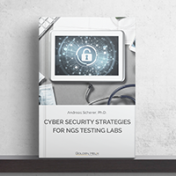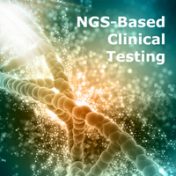Welcome to our engaging journey through the fascinating world of pharmacogenetics! In this friendly guide, we’re going to explore how our unique genetic makeup influences the way we respond to medications. It’s all about making medicine more personalized and effective for everyone. This eBook, Pharmacogenetics takes you into the world of a cutting-edge field at the intersection of genetics and… Read more »
I am pleased to share with you the official release of my updated eBook, “Precision Medicine“. Almost 2,500 years ago, Hippocrates captured one of the key principles underlying precision medicine. In the 21st century, we take an understanding of the individual characteristics of a person to a new level. By leveraging information about an individual’s genome, we are able to… Read more »
We’re excited to share the release of a newly updated resource from our CEO, Andreas Scherer, Ph.D. This morning, we published the Second Edition of his eBook, Genetic Data Warehousing, offering an in-depth exploration of how data warehousing technologies are shaping the future of clinical genomics and precision medicine. This updated edition reflects the growing complexity of managing genetic data… Read more »
At Golden Helix, we’re committed to advancing precision oncology through robust software solutions that streamline clinical workflows. As the field of cancer genomics continues to evolve, staying informed about the latest best practices and tools is more important than ever. That’s why we’re excited to announce the release the second edition of Clinical Variant Analysis for Cancer eBook from our… Read more »
Golden Helix is in a unique position to provide a secure on-premise analysis solution. This capability is based on two enablers. First, we build our software solutions from scratch and from the ground-up with the assumption that it should run on any operating system and potentially behind firewalls or even without internet access. Second, we provide these solutions on a licensing model based on training and supporting users, not… Read more »
Cyber security threats to organizations are more diverse and dangerous than ever, ranging from curious teenagers testing their skills to insider threats and state-sponsored hackers. On the highest-end, some state-financed actors extend their reach as far as possible into foreign countries. Motivation and intentions might vary, but the outcome for the targeted organization is the same. Data breaches lead to a lack of trust in the… Read more »
Data and cyber security breaches are a fact of life. Organizations are aware of the threats and putting their best efforts up to prevent them as much as possible. Industries across the entire spectrum have been exposed in recent years. I will go through a few examples to show how pervasive this issue has become. Target One prominent data breach occurred… Read more »
Hospitals and testing labs are undergoing a digital transformation like any other business in our time. They deal with personal data in categories with the highest level of security requirements: personal identity and medical records. The architecture chosen to store and analyze this data is critical to provide the best protection against a data breach incident. The liability and institutional… Read more »
We’re excited to kick off the year with the release of our latest eBook, “Cyber Security Strategies for NGS Testing Labs“. As precision medicine continues to transform healthcare through data-driven diagnostics and targeted therapies, it brings with it a new set of challenges—particularly around protecting sensitive genomic data. Traditionally, clinical laboratories and healthcare providers focused on physical security measures. Today, cyber threats… Read more »
This generation of scientists, clinicians and bioinformaticians have already elevated the standards for diagnosis, prediction and care, ultimately improving patient outcome for millions of people by leveraging genomic information. This trend is only going to continue. Next-gen sequencing has made its way into the clinic. Golden Helix supports the adoption of Precision Medicine by building products, such as our VarSeq… Read more »
With a properly defined wet-lab and bioinformatics process, we are able to zero in on clinically relevant variants. How does a lab report on the outcome of their analysis? We find that most laboratories conduct their variant classification based on the guidelines formulated by the American College of Medical Genetics (ACMG) for inherited diseases. The ACMG guidelines for variant classification… Read more »
Any validated bioinformatics pipeline must be continuously monitored. Quality management in clinical testing labs ensures that any divergence from predefined quality metrics during the analysis of clinical samples is investigated. For example: There is an insufficient number of sequence reads that passed the predefined base quality score threshold The number of variants identified in a data set may deviate substantially… Read more »
After the Wet Lab process has been completed, the bioinformatics analysis of the sequencing data work begins. The next three blogs will focus on three aspects of this process. The building blocks of a bioinformatics pipeline, documentation and validation (today’s topic) Quality Management Clinical Reporting The Building Blocks of an NGS PipelineThe bioinformatics process to analyze NGS data occurs in three… Read more »
Getting the NGS wet bench process right is not a small undertaking. Targeted NGS assays such as multigene panels or exome sequencing allow for the targeted analysis of genomic regions that are of particular interest. For every sample type, e.g. blood, formalin-fixed paraffin-embedded specimens, saliva etc, there must be a detailed protocol in place outlining how each sample type is going… Read more »
We have come a long way since Next-Generation Sequencing (NGS) evolved as a set of technologies in the 1970s. The higher throughput and rapid reduction of costs associated with NGS have lead to the accelerated adoption of clinical testing that we are experiencing today. Currently, it is applied to analyze inherited diseases, tumors, hematologic malignancies and infectious diseases. It is… Read more »
The adoption of genetic services is key to our ability to provide personalized medicine in the future. The goal is to better diagnose diseases, predict their outcome, and choose the best possible care option for a patient. We still have a long way to go to achieve this goal. While there is agreement about the ultimate goal, there is still… Read more »











